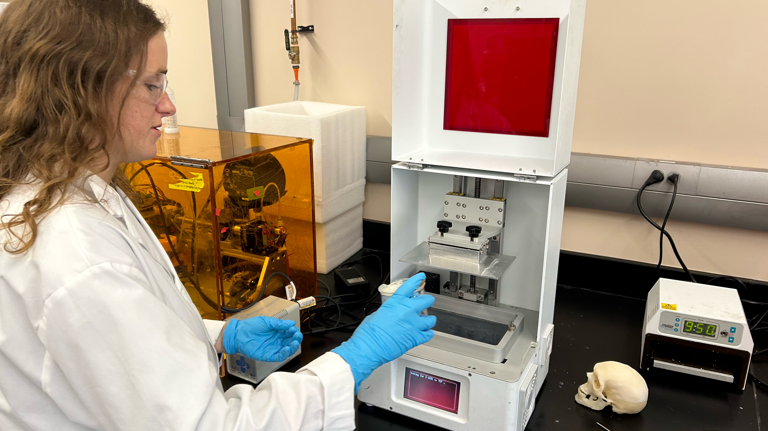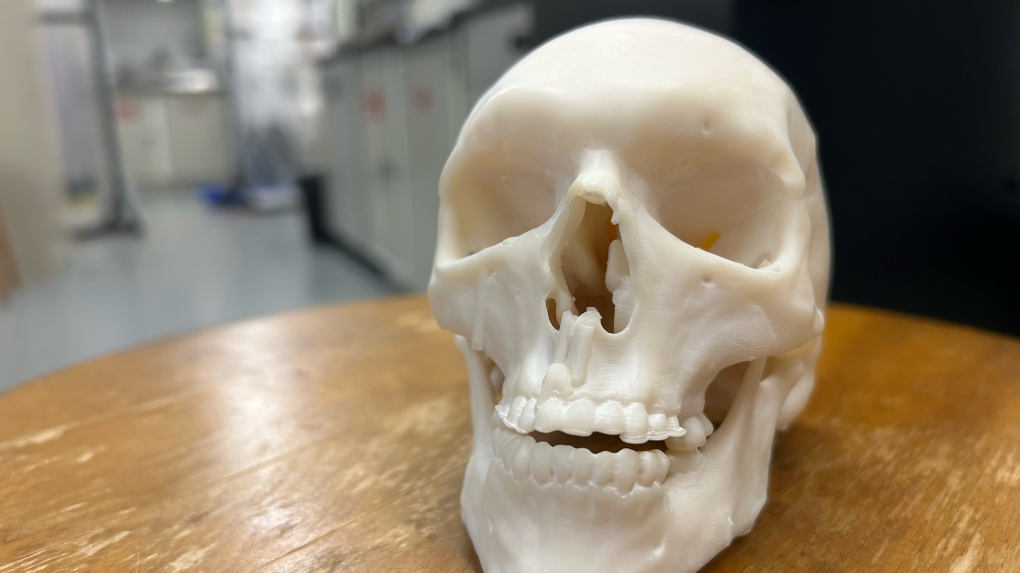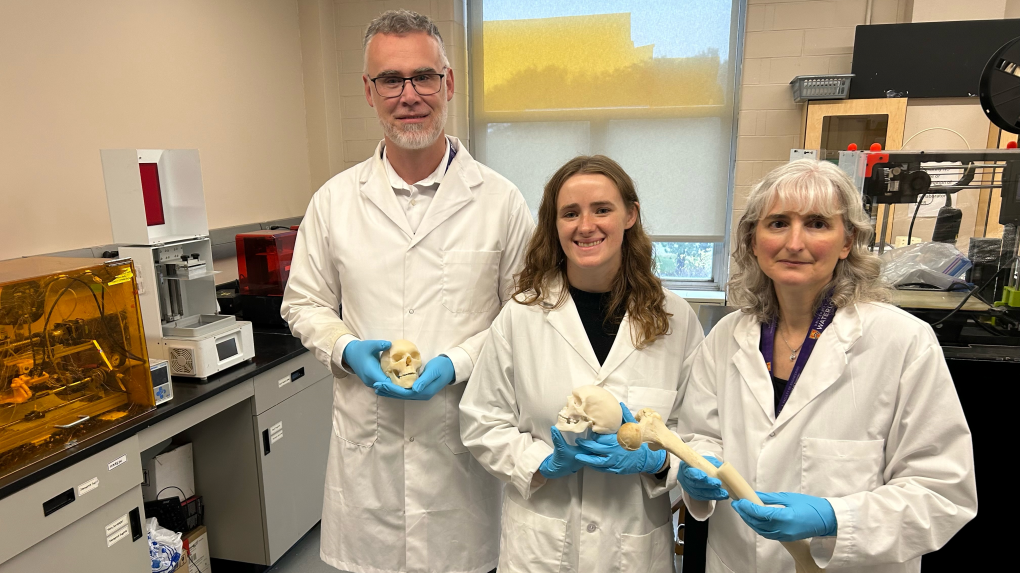Ontario university developing 3D-printed bones to improve outcomes for cancer patients
Synthetic bone that essentially dissolves as real bone grows.
It’s an idea that could dramatically improve the quality of life for cancer and trauma patients, and thanks to a team at the University of Waterloo, it could soon be a reality.
Thomas Willett, an associate professor of biomedical engineering at UW, got the idea while working at Mount Sinai Hospital in Toronto.
“I worked with orthopedic surgeons there, and I became exposed to this problem of large defects that don't heal by themselves,” he said.
A simple bone break can mend itself, but for bone cancer or trauma patients who are in need of an entire new bone or bone graft, it's more complicated.
Which is why Willett and his team have developed a very specific substance that can be 3D-printed to meet specific needs.
“One advantage is that our material doesn't contain any cellular material, so we're not going to have a rejection, like you would have with an organ,” Willet explained.
 Elizabeth Diederichs pouring the raw material into the 3D printer at the University of Waterloo. (Krista Sharpe/CTV News)
Elizabeth Diederichs pouring the raw material into the 3D printer at the University of Waterloo. (Krista Sharpe/CTV News)
His colleague on the project, another professor of biomedical engineering at the University of Waterloo, said that also means fewer surgeries.
“It's going to likely help improve quality in life and also reduce health care costs,” said Maud Gorbet. “If you think, in the long run, how much it costs.”
The substance has the consistency of pancake batter.
 A 3D-printed skull, made with synthetic materials, at the University of Waterloo. (Krista Sharpe/CTV News)
A 3D-printed skull, made with synthetic materials, at the University of Waterloo. (Krista Sharpe/CTV News)
Elizabeth Diederichs is a graduate student and working on project as part of her PhD.
“We are working with a biopolymer, nanocomposite. So it's basically polymers from sources such as soybean oil, and then hydroxyapatite, which is the mineral, that's actually in your bones currently,” she said.
Once placed in a person, the idea is that the 3D printed bone would eventually dissolve as the body grows natural bone to replace it.
It's taken about half a decade to develop the version of the material they now use which, in some cases, may need to be strong enough to withstand the weight of the human body.
 Thomas Willett, Elizabeth Diederichs and Maud Gorbet hold bones and skulls that have been 3D printed with synthetic materials. (Krista Sharpe/CTV News)
Thomas Willett, Elizabeth Diederichs and Maud Gorbet hold bones and skulls that have been 3D printed with synthetic materials. (Krista Sharpe/CTV News)
For now, the team is only printing small versions of bones and skulls, to test the substance.
The plan, though, is to scale up the project.
“This technology is fairly new, so as its building, we're getting more and more capabilities of what we can do with it,” Diederichs added.
Willett said it will likely take at least a decade and millions of dollars before the substance is ready for hospitals.
But, for now, the team is working towards clinical trials and securing more funding.
CTVNews.ca Top Stories

W5 Investigates A 'ticking time bomb': Inside Syria's toughest prison holding accused high-ranking ISIS members
In the last of a three-part investigation, W5's Avery Haines was given rare access to a Syrian prison, where thousands of accused high-ranking ISIS members are being held.
'Mayday!': New details emerge after Boeing plane makes emergency landing at Mirabel airport
New details suggest that there were communication issues between the pilots of a charter flight and the control tower at Montreal's Mirabel airport when a Boeing 737 made an emergency landing on Wednesday.
BREAKING Supreme Court affirms constitutionality of B.C. law on opioid health costs recovery
Canada's top court has affirmed the constitutionality of a law that would allow British Columbia to pursue a class-action lawsuit against opioid providers on behalf of other provinces, the territories and the federal government.
Cucumbers sold in Ontario, other provinces recalled over possible salmonella contamination
A U.S. company is recalling cucumbers sold in Ontario and other Canadian provinces due to possible salmonella contamination.
Irregular sleep patterns may raise risk of heart attack and stroke, study suggests
Sleeping and waking up at different times is associated with an increased risk of heart attack and stroke, even for people who get the recommended amount of sleep, according to new research.
Real GDP per capita declines for 6th consecutive quarter, household savings rise
Statistics Canada says the economy grew at an annualized pace of one per cent during the third quarter, in line with economists' expectations.
Nick Cannon says he's seeking help for narcissistic personality disorder
Nick Cannon has spoken out about his recent diagnosis of narcissistic personality disorder, saying 'I need help.'
California man who went missing for 25 years found after sister sees his picture in the news
It’s a Thanksgiving miracle for one California family after a man who went missing in 1999 was found 25 years later when his sister saw a photo of him in an online article, authorities said.
As Australia bans social media for children, Quebec is paying close attention
As Australia moves to ban social media for children under 16, Quebec is debating whether to follow suit.

































